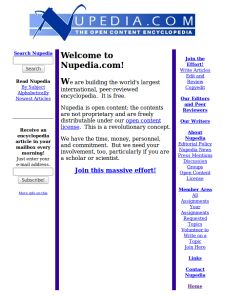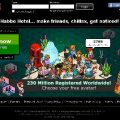Wikipedia’s Startup Story – How Jimmy Wales Started The Biggest Online Encyclopedia
Wikipedia.org is the biggest and the most popular free online encyclopedia today. Its knowledge database has been created by millions of people from all over the world. Currently, (2019) the site has more than 40 million articles in more than 293 different languages. That makes around 3.7 billion words which are 85 times more than all of the words in all 120 volumes of “Encyclopædia Britannica“. and what’s even more amazing is that all of this content was created by the 27 million registered users (voluntarily) and it’s available for free use, under the Creative Commons Attribution-ShareAlike License. Monthly, more than 14% of all people, who use the Internet visit Wikipedia. There you can find information about almost any existing topic you could imagine – from how to bake cookies to how to build a nuclear weapon and launch in it space 🙂 … It has become the 9th most popular site on Earth, according to alexa.com, and now we’ll go through Wikipedia’s amazing startup story.
And here is how it all began – Wikipedia’s startup story
Once, there was a site called Nupedia – a free encyclopedia, written exclusively by professionals and specialists. It was run by a small company called “Bomis“, and one of its founders was a person named Jimmy Wales. Nupedia was intended to become one of the biggest places of knowledge on the Internet. Although there were many volunteers who wanted to become editors of the site, it was advancing really slowly. All articles had to pass a complicated approval process, which resulted in only a few of them being approved. After the first 1 year of existence, Nupedia had an unimaginable number of 21 articles… they were of very high quality but yet, just 21. That was a craze… So many smart guys in one place and just 21 writings?!? The project’s chief editor was Larry Sander and he and Wales started looking for some ways to speed things up a little. By that time, the wiki-structured sites were gaining momentum. Sander thought that using a wiki platform for the site might be a nice choice and he introduced the idea to Wales. This was how the concept of Wikipedia was born back in 2001.
The official birth of the modern Wikipedia – Jan 15, 2001
The plans were for the UseModWiki platform to be installed, where everybody would be able to publish content freely and the best of it would be used for Nupedia. So, Jimmy Wales installed a copy of the platform and put it online on the 10th of January 2001. Most of the editors of Nupedia didn’t want everyone to be able to mess with their work, that’s why they insisted on a different name to be given to the project. This is how the domain name Wikipedia.org was registered and launched five days later – on the 15th of January, 2001. This was the official birth of the site.
Wikipedia Starts Growing Fast
The small site launched as a sub-project of Nupedia started growing extremely fast. Anyone could publish there and the uploaded articles didn’t require editorial review. It was no surprise that the site soon surpassed its older sister Nupedia. With more than 20 000 articles in more than 18 languages just after a year of existence, Wikipedia quickly became the main project. Initially, most of the traffic to the site was coming from the major search engines, but soon some of the biggest media spotted its growth and began writing about the online encyclopedia. It also appeared on TV and other media channels. This boosted its popularity and in August 2002, the number of published articles reached the mind-blowing number of 40 thousand (a little humor here, today the site has 37 million pages).
The start of the project was not a problem-free one. The quick growth of Wikipedia attracted hackers and some other people who started abusing the site. Also, there were no clear principles about what content should be kept online and what not. This was how The Rules of Wikipedia were created. But these were not as big issues as those that would come later. The biggest effort of Wikipedia’s team was to keep the articles neutral, quality, and accurate. Because of that, anybody could change them, this was a really tough task. Many believed that the content there was in some way biased and chunky. For example, there was a published article there, saying that Robby Williams was eating pet hamsters for a living in pubs in and around Stoke… In another one was written that David Beckham was a Chinese goalkeeper in the 18th century… Such problems are still present today, although the most common issues of this type have been addressed.
Running a big site like Wikipedia is an expensive action. The site receives huge amounts of traffic. By the beginning of 2012, the site had 10 billion views each month and currently has more than 4 million articles. Such a beast eats several millions of dollars every year in expenses… Although a single advertising banner would generate millions of dollars in revenue every month, Wales is determined not to do this and the encyclopedia remains free of ads. Wikipedia has remained totally free for use by everyone in the world. Its revenue comes exclusively from donations. Everybody who likes the project and wants to support it can do this on their donations page.
Interesting Facts About Wikipedia
1. Wikipedia was founded by Jimmy Wales and Larry Sanger in 2001 as an open-source encyclopedia project. It has since become one of the top 10 websites in the world.
2. Wikipedia is written collaboratively by volunteers from around the world. As of 2021, there were over 1.6 million editors with over 140 different languages represented.
3. More than 50% of all internet searches for answers are for Wikipedia pages, making it highly useful for students, researchers, and hobbyists alike!
4. The longest article on Wikipedia as of 2021 is about William Hasting’s murder: a shocking event in 13th-century British history that is still remembered today!
5. Wikipedia is constantly updated – both for accuracy and to add new content – and has over 132 million changes or edits made by dedicated volunteers every year!
6. The most popular article on Wikipedia is “List of most viewed YouTube videos” which received a whopping 4 billion views as of January 2021 while still continuing to grow!
7. Despite its popularity, Wikipedia has a few flaws: many people falsely believe that much of its content can be unreliable at times due to a lack of source citations or referencing other sources like published books or journals – however, studies show that most entries are accurate!
8. The second-largest article on Wikipedia is “List of countries by population” with over 3 million views between 2020-21 alone!
9. The third-largest article is “Deaths in 2019” with over 2 million views between 2020-21 alone!
10 . Finally – everyone knows about this … but did you know that anyone can edit their own article on Wikipedia? All you need to do to create your own is register an account and do your research before editing so you don’t spread false information!
More About The Free Encyclopedia
More about the history of this great encyclopedia you can see (and even edit) here: https://en.wikipedia.org/wiki/History_of_Wikipedia
Wikipedia On:
Twitterr: https://twitter.com/#!/wikipedia
Facebook: https://www.facebook.com/wikipedia
Did you enjoy our brief history of the Wikipedia article? Please, don’t be shy about sharing it with friends on some social networks. This would be a great help to us! Thanks!
In the following video you can see how Wikipedia reached the people in this small village in Peru:
Please, share this post and support our site. This way you will help us write many more cool articles like this one.







